 Petzlover
Petzlover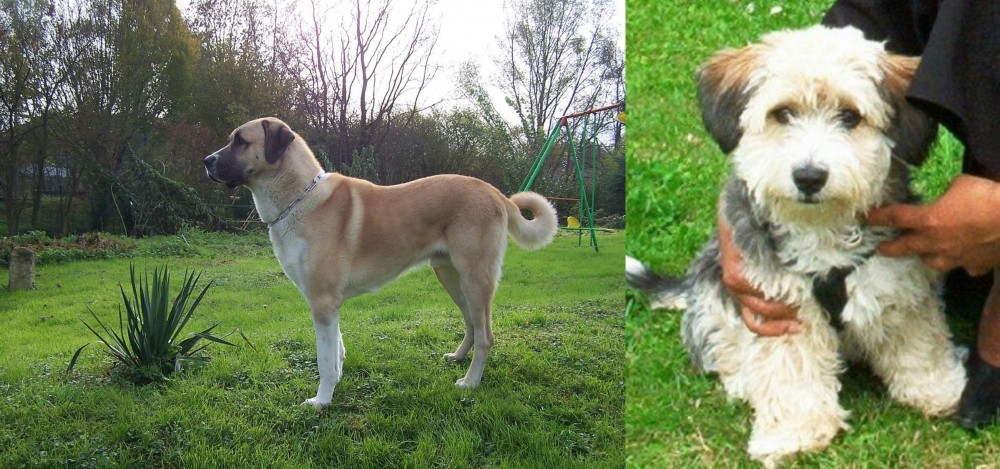 Anatolian Shepherd is originated from Turkey but Yo-Chon is originated from United States. Anatolian Shepherd may grow 46 cm / 19 inches higher than Yo-Chon. Anatolian Shepherd may weigh 64 kg / 142 pounds more than Yo-Chon. Anatolian Shepherd may live 3 years less than Yo-Chon. Anatolian Shepherd may have more litter size than Yo-Chon. Both Anatolian Shepherd and Yo-Chon requires Moderate Maintenance.
Anatolian Shepherd is originated from Turkey but Yo-Chon is originated from United States. Anatolian Shepherd may grow 46 cm / 19 inches higher than Yo-Chon. Anatolian Shepherd may weigh 64 kg / 142 pounds more than Yo-Chon. Anatolian Shepherd may live 3 years less than Yo-Chon. Anatolian Shepherd may have more litter size than Yo-Chon. Both Anatolian Shepherd and Yo-Chon requires Moderate Maintenance.
 Up in the mountains of central Turkey, in the region called Anatolia, a large, strong and rugged dog breed was born and is honored today on a postal stamp. This was the Anatolian Shepard – keeper of the flocks with strength, agility and speed. The Anatolian Shepard is able to pursue and catch any predator that threatens his livestock and they are his livestock. His keen sense of hearing and his excellent sight only add to his prowess as a protector.
Up in the mountains of central Turkey, in the region called Anatolia, a large, strong and rugged dog breed was born and is honored today on a postal stamp. This was the Anatolian Shepard – keeper of the flocks with strength, agility and speed. The Anatolian Shepard is able to pursue and catch any predator that threatens his livestock and they are his livestock. His keen sense of hearing and his excellent sight only add to his prowess as a protector.
The Anatolian is a giant dog, classified as a shepherd by the UKC – Kennel Club of the United Kingdom, while he is classified as a mountain dog or molossus by the Federation Cynologique International. When the breed was created, they were a gift to the farmers in the mountains to guard the livestock from cheetahs. This helped the cheetahs to stop attacking the livestock and prevented the farmers from wiping out the cheetah population by shooting them.
The Anatolian Shepard does have some controversy in his lineage as in some areas he is considered to be either the most closely related or the same breed as the Turkish Kangal Dog. The Anatolian is considered to have a blood line that goes back at least 6000 years.
They are direct descendants of mastiffs and mountain dogs. Yet they have the long legs, agility and aloofness of the sight hounds that are also in their bloodline. Originally called the “Coban Kopegi” or shepherd dog by their Turkish farmers, they were eventually separated into the breed called the Anatolian Shepard. When the breed was first brought into the United Kingdom the line of the Kangal dog was first. Then they were crossed with dogs called Anatolian Shepherds. Many breeders believe that the Anatolian Shepherd is a category that includes the Kangal, Coban Kopegi, Aksaray Malaklisi and the Akbash dog.
So as of January 2012, the Australian National Kennel Club no longer considers the Anatolian Shepard and the Kangal as separate breeds. The UK Kennel Club now recognizes the Kangal and the Anatolian as the same breed. For others they are still clearly separate and distinct breeds with the ASD being their own breed. In fact, the government of Turkey recognizes them as separate breeds and the Kangal Dog as the National Dog of Turkey.
The Anatolian Shepard was already in the United States in when the Anatolian Shepard Club of America came into being because of a young naval officer who had met the dogs in Turkey. They were allowed into the Miscellaneous Class of the American Kennel Club in 1996 after this naval officer had been breeding them in California for years. By 1998 they had moved to the Working Group where they reside today.
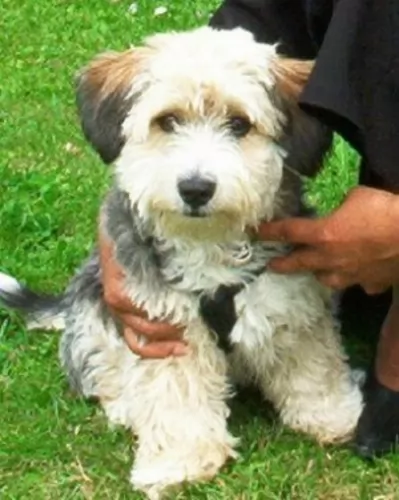 The Yorkie Bichon or Yo-Chon as he is fondly referred to as a designer crossbreed hailing from the United States.
The Yorkie Bichon or Yo-Chon as he is fondly referred to as a designer crossbreed hailing from the United States.
Information isn’t readily available on the origins of this cute little dog, but the dog is believed to be a cross between a Bichon Frise and Yorkshire Terrier.
It is thought that the dog was developed in the United States from about 1998 to 2001. As a hybrid, the Yorkie Bichon isn’t recognized by the American Kennel Club.
 Coming from the mountains and guarding their flock against cheetahs has led the Anatolian Shepherd to be a muscular dog with broad heads and thick necks and sturdy, strong bodies. Their ears drop and are triangular in shape, while their muzzles are rectangular with tight lips. Their double coat is thick and warm fitting for life in the mountain regions. They do blow their coats with excessive shedding twice a year. The fur on their throat is extra thick for their protection.
Coming from the mountains and guarding their flock against cheetahs has led the Anatolian Shepherd to be a muscular dog with broad heads and thick necks and sturdy, strong bodies. Their ears drop and are triangular in shape, while their muzzles are rectangular with tight lips. Their double coat is thick and warm fitting for life in the mountain regions. They do blow their coats with excessive shedding twice a year. The fur on their throat is extra thick for their protection.
Muscular, thin, their rib cage is large while their stomach is small. Their tails can be intact or docked. The Anatolian Shepherd is much like the Kuvasz or the Great Pyrenees in their size, shape and responsibilities. He is more agile and slenderer than those two dogs. Their bite is scissors or level, while their eyes are almonds, set apart in their heads.
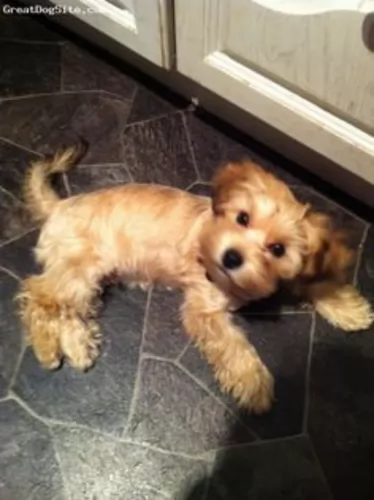 The Yo-Chon stands between 25 and 30cm and weighs in the region of 2 to 4kg. He can be like a teddy-bear this little dog and the coat can be either silky and straight or wavy. It is medium length and some people have the coat professionally trimmed.
The Yo-Chon stands between 25 and 30cm and weighs in the region of 2 to 4kg. He can be like a teddy-bear this little dog and the coat can be either silky and straight or wavy. It is medium length and some people have the coat professionally trimmed.
The low shedding coat comes in a variety of colors – cream, grey, tan, white, black or bi-colored.
Your Yorkie Bichon will no doubt have some habits that come from both parent breeds. Your dog is likely to be independent, social, friendly, social and loving, wanting to spend lots of time with you.
They’re small but they make good watchdogs with their high-pitch bark. Your Yo-Chon is an intelligent little dog too and by having him trained and socialized he is well behaved and pleasant to have around. You can tell him to lie down, sit or stay which is useful when you have visitors.
He gets on well with children, but the puppies particularly are tiny and fragile and they can easily get hurt by untrained and undisciplined children.
 This breed is independent, stubborn and strong. They are great protectors of their flocks and people, but they are incredibly challenging to own. They are intelligent, loyal dogs who learn quickly when they want to. They key being “when they want to”. The Anatolian Shepard was bred to be nomadic, following the herd and hunting for the herd’s predators. Microchip your ASD because they will roam if they get the chance.
This breed is independent, stubborn and strong. They are great protectors of their flocks and people, but they are incredibly challenging to own. They are intelligent, loyal dogs who learn quickly when they want to. They key being “when they want to”. The Anatolian Shepard was bred to be nomadic, following the herd and hunting for the herd’s predators. Microchip your ASD because they will roam if they get the chance.
If you want your Anatolian to get along with other dogs, cats or other animals, socialize them together when the ASD is a puppy. If the animal or child is part of his flock the ASD will protect them with his life. Though he is loving, quiet and calm, the Anatolian is just as demanding and dominating. Never let your Anatolian Shepherd believe that he is above the humans in the pack or you will have a major problem controlling him. He will be especially leery of strangers and will not accept your word that the stranger is part of the family. However, if she understands that humans are above her and you are the leader, she will accept any person you accept.
Even if they accept strangers, they will not allow anyone other than the family into the home when the owner is not there. This is a proud, proud dog that can be stubborn, demanding and bossy. Being such a large dog, you need to be in control. This is not a dog for everyone. Be firm, confident, be loving and consistent when training an Anatolian Shepherd. Do not offer your ASD any additional training in protection. He doesn’t need it and it could be detrimental. They will protect children, but they do not respect them. Therefore, supervise their interactions with children.
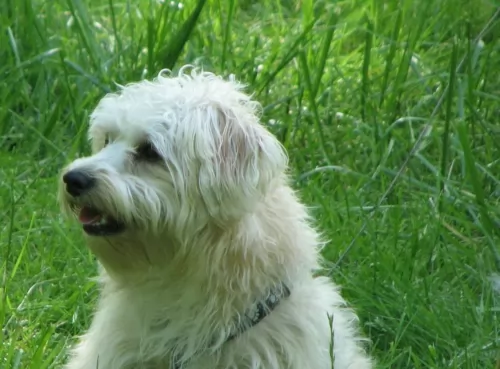 The Yo-Chon is an independent, happy dog who loves nothing more than to be surrounded by all his favorite human beings.
The Yo-Chon is an independent, happy dog who loves nothing more than to be surrounded by all his favorite human beings.
They are loving, loyal and gentle dogs and are good playmates for children who have been taught how to handle them with care and kindness.
He is smart and has an amicable nature and will take kindly to being trained and socialized.
With the Yo-Chon in your life, you can be sure you’re going to benefit from having a splendid family pet and companion.
 This is a healthy breed without a lot of the issues that plaque other giant breeds. In one recent survey the leading cause of death among the ASD is cancer and old age. Skin issues are more prevalent than dysplasia though it does occur. They have a sensitivity to anesthesia and their immune system does take longer to mature so all young ASD should be discussed with vets before any vaccinations are given. Bloat is not as common among this breed either. They should be screened for eyelid inversion or entropion. They are susceptible to Demodectic Mange or demodicosis which is caused by a mite.
This is a healthy breed without a lot of the issues that plaque other giant breeds. In one recent survey the leading cause of death among the ASD is cancer and old age. Skin issues are more prevalent than dysplasia though it does occur. They have a sensitivity to anesthesia and their immune system does take longer to mature so all young ASD should be discussed with vets before any vaccinations are given. Bloat is not as common among this breed either. They should be screened for eyelid inversion or entropion. They are susceptible to Demodectic Mange or demodicosis which is caused by a mite.
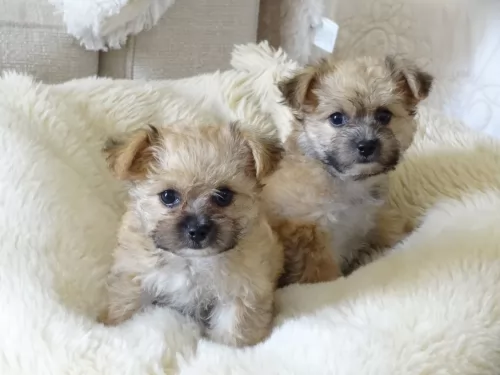 Both the Yorkie and Bichon Frise are dog breeds that are prone to Legg-Calvé-Perthes disease. This is when there is insufficient blood supply to the hind thigh bone, so the dog becomes lame.
Both the Yorkie and Bichon Frise are dog breeds that are prone to Legg-Calvé-Perthes disease. This is when there is insufficient blood supply to the hind thigh bone, so the dog becomes lame.
Surgical correction is necessary. Like small dogs in general, the Yochon might have dental issues. Slipped kneecaps, hypothyroidism and eye problems might affect the Yochon as well.
 Feed your Anatolian Shepherd a measured amount twice a day and keep him from becoming overweight. It is recommended that you feed her from 4-6 cups of dry, high quality food for the entire day. The more active your dog is, the more she will need to eat. Using treats in training is appropriate but don’t give her too many as these will add to the waist line.
Feed your Anatolian Shepherd a measured amount twice a day and keep him from becoming overweight. It is recommended that you feed her from 4-6 cups of dry, high quality food for the entire day. The more active your dog is, the more she will need to eat. Using treats in training is appropriate but don’t give her too many as these will add to the waist line.
As mentioned previously this is a very healthy breed especially when compared with other giant and/or mountain dog breeds. However, they are susceptible but not prone to:
Should be tested for this condition in which the bones don’t fit well into the joint. Elbow Dysplasia – the same as above except it is the arm bone does not fit well into the joint. Both these conditions can cause arthritis or lameness.
Caused by mites and a weakened immune system it can result in patches of scaly, red skin and hair loss. A generalized version can cover the entire body and can be fatal.
This can result if obesity, hair loss, epilepsy, lethargy and other skin condition. It is easily treatable.
Mentioned previously it causes the eyelid to roll inward and requires surgery.
Your Anatolian Shepherd does not need a lot of exercise despite his size. A large yard with a good fence will do for him as long as he gets a walk daily. If they can run free in a large yard they will be happy. If not, you will need to take them to a dog park, preferable when other dogs are NOT present. You can’t assume he will be ok with other dogs. Never walk them off leash as they love to wander. They need a job to do.
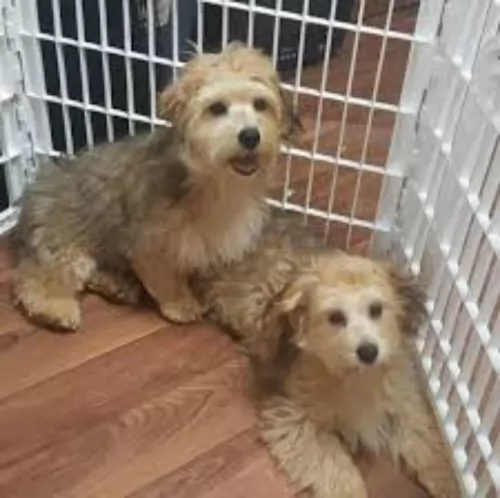 Everybody is busy and they don’t always have time to exercise their pets. As a human being, your health relies heavily on the exercise you get so you and your dog can exercise together.
Everybody is busy and they don’t always have time to exercise their pets. As a human being, your health relies heavily on the exercise you get so you and your dog can exercise together.
These days if you seriously don’t have time and you have money to spare, there are excellent doggy daycare centers where your dog can have fun playtimes with other dogs and people.
Dog exercises will change over time with age but at least try to get used to giving your pet a walk every day as this kind of exercise can extend into old age with both you and your pet.
Swimming, ball games, fetch games and walks or hikes are all great forms of exercise.
Good nutrition ensures your Yorkie Bichon has a good chance to be healthy and energetic. Some of the commercially manufactured dog foods you get are made with bad ingredients and they can make your dog sick.
The good quality ones can be nutritious for your dog and also wonderfully convenient. Always read the packaging labels so you know what your dog’s getting.
Cooked vegetables, boiled chicken and brown rice, nicely chopped up and added to the dry kibble can add variety to your pet’s diet while remaining deliciously nutritious and tasty as well.
Brush your Yo-Chon at least twice a week to keep the hair silky and shiny. Clip your dog’s nails when they get long.
Check inside his ears for signs of redness and the possibility of an infection. Try and look inside his mouth too for bad teeth as this can cause lots of health problems for your pet.
If you don’t have the time to do all these things, there are professional pet groomers who will do all these grooming chores for you.